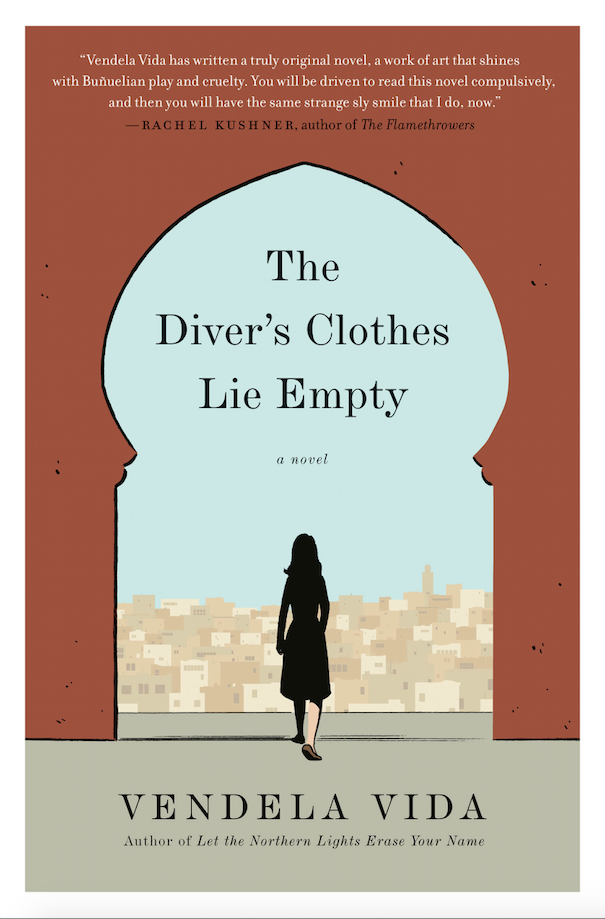Vendela Vida On Writing, Lying, and Living with Dave Eggers

Vendela Vida. Photo credit: Annabel Mehran
“I don’t recommend having your stuff stolen in a foreign country,” says author Vendela Vida with a laugh. “But it’s really interesting.”
The author of five books and founding editor of The Believer is talking about a trip she made to Morocco some years past, when she had her belongings stolen as she checked into her hotel. As she sat at the local police station answering strangely irrelevant questions—“like ‘what was the profession of your great, great, great grandfather’”—it dawned on her that the unfortunate incident could have its upside.
“I realized that what was happening to me would make for a great beginning for this novel I was trying to write,” she said, adding that the realization lifted her mood so visibly that everybody present became confused by her sudden buoyancy.
The novel that emerged, The Diver’s Clothes Lie Empty, is an artful, driving exploration of identity that centers on an American woman who travels to Casablanca and finds herself suddenly stripped of her own name and adopting that of a stranger. There are echoes there of her first three novels, each of which concerned a female protagonist who finds herself in a foreign or alien environment, dogged by her past.
Vida once called those first three books a trilogy, so what does this fourth novel make of that definition? “I wish I’d never used that word,” she admits, adding with a writer’s precision that “triptych” would have felt more accurate. “But this one [The Diver’s Clothes Lie Empty] felt different in that it’s lighter in tone, there’s more humor.”
It's true, there are moments of levity here, but don’t be misled: This is a tense, often nerve-wracking read, the anxiety heightened by the fact that it all comes to the reader as a direct address, in the second person.
“What’s really interesting about the second person is that if it works well it provides immediacy in that the reader is in the protagonist’s shoes from the start,” says Vida. “It can be prescriptive but it can also sound like someone talking to themselves, which I thought was appropriate. And it can also be accusatory: ‘You do this! You do that!’”
The book, which comes in at just over 200 pages, was written at a serious clip. "I cleared a few months of my life as much as I could. I was so afraid of falling out of the fevered dream of writing it." It helped that her husband, writer Dave Eggers, understood her need for time, and was there to "pick up the slack" as she puts it. "I didn’t do dinners for a month!" He was also on hand to give her instant feedback on her work in progress. "That's the advantage of a writer as a partner," she says. "He has to get back to me fairly quickly—I know where he is in the house!"
For Vida, writing about a woman searching for herself in unfamiliar terrain had a particular appeal. “I like to write the kind of books that I like to read and I really love reading books about Americans in another country,” she says. “There’s that time when the physical you has arrived and the mental, emotional you hasn’t caught up yet.”
She cites Graham Greene and Paul Bowles as examples, but explains that while she wrote The Diver's Clothes Lie Empty, movies were her fodder, among them Michelangelo Antonioni’s 1975 film The Passenger in which the Jack Nicholson character also assumes a false identity, and Anthony Minghella’s 1999 thriller The Talented Mr Ripley, based on a Patricia Highsmith book of the same name.
“I was afraid of reading anything. I didn’t want it to be influenced by anything I was reading,” she says. “But I did want to watch a lot of movies that dealt with identity.”

Which may explain why Booklist highlighted how The Diver's Clothes Lie Empty is “told cinematically, in one long, bewitching take.” Vida, who also wrote the screenplay for the 2009 comedy Away We Go with her husband, the writer Dave Eggers, admits movies informed the book in various ways. She saw it as a film when she was writing it, but film-making also features prominently in the book. “There is a film set, but there are also other film devices, there’s a surveillance video,” says Vida. “It all fit into this theme of doubles, and mirror images that I like.”
Her experiences on the set of Away We Go found their way into The Diver's Clothes Lie Empty, particularly what she recollects as all the “standing around and waiting for things” that goes on in film-making. “The other thing that was so interesting to me, having never spent much time on a film set before that experience, was how much artifice you have to use to make it look real.”
What’s real and what’s artifice, what’s self and what’s other, what’s truth and what’s the lie—they’re all questions that play through The Diver’s Clothes Lie Empty. Vida, who has admitted to a penchant for lying as a child, is still interested in its narrative potential. “Lying is such an interesting device, because the character lies and can’t go back.”
Beyond their shared experience of robbery in Morocco, it’s in that realm of lies and invention that Vida an her protagonist overlap most clearly. “As fiction writers, we’re all liars,” she says. And, like this book about invention and fakery, it rings startlingly, cuttingly true.
Vendela Vida reads at Powell's City of Books on Wednesday, June 17 at 7.30 pm




